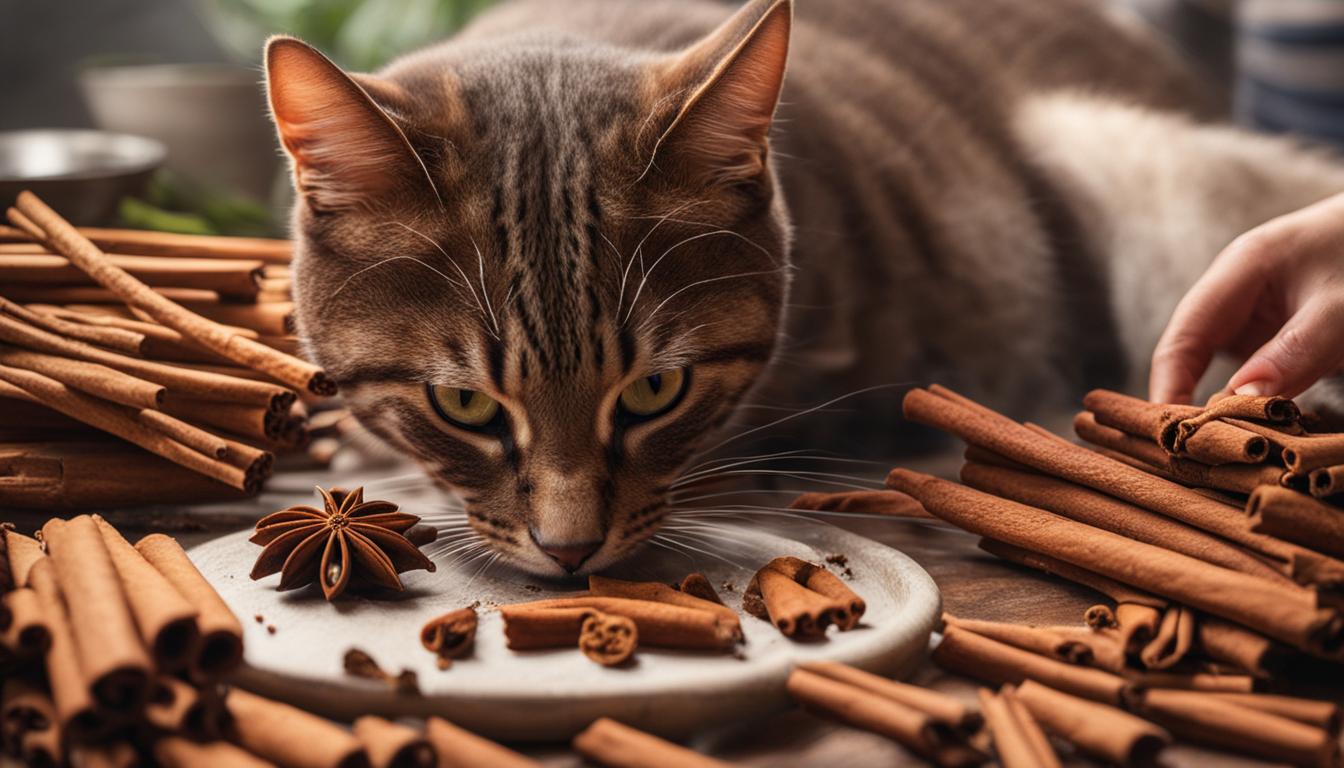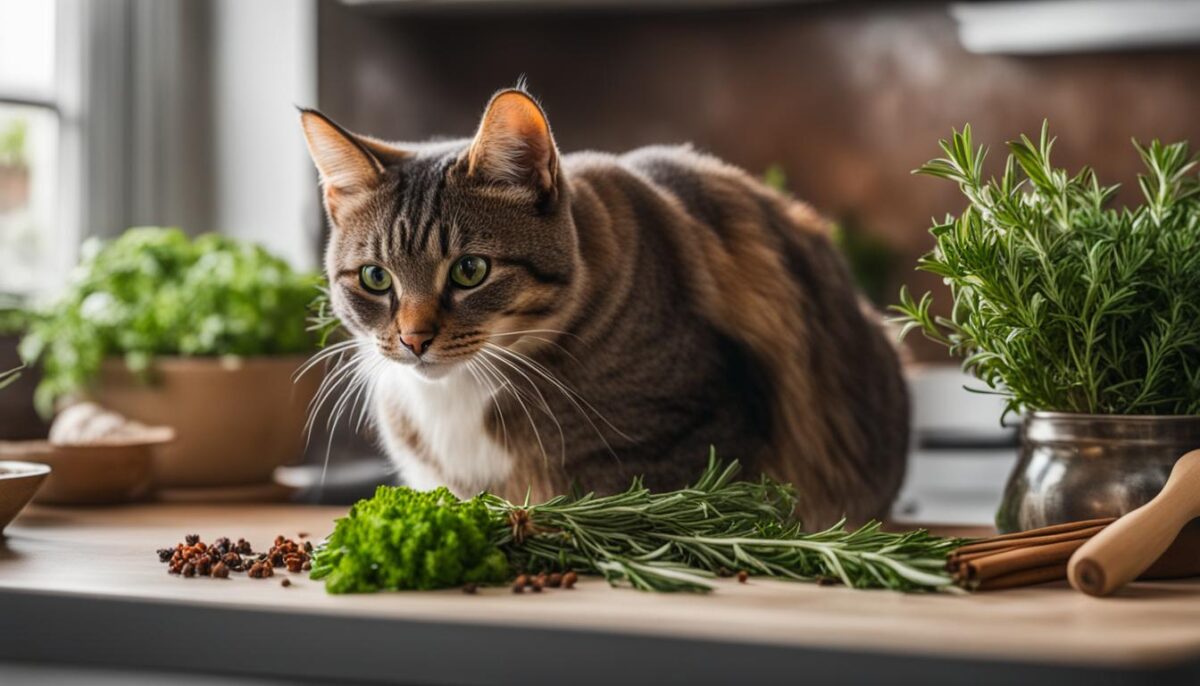Many cat owners often wonder if it’s safe to give their feline friends a taste of cinnamon. After all, it’s a popular spice used in various recipes and beverages. But when it comes to cats, their dietary needs are quite different from ours. Cats are obligate carnivores, meaning their bodies are designed to primarily consume meat. So, is it safe for cats to eat cinnamon?
While cinnamon itself is not toxic to cats, there are potential risks and health concerns associated with its consumption. In this article, we will delve into the safety and potential effects of cats eating cinnamon, so you can make informed decisions when it comes to your furry friend’s diet.
Key Takeaways:
- Cinnamon is not toxic to cats but can cause gastrointestinal upset if consumed in excess.
- Cats may have allergies or sensitivities to cinnamon, leading to skin irritations or gastrointestinal issues.
- Large quantities of cinnamon can contain compounds that can be toxic to cats and may lead to liver damage.
- It is best to avoid feeding cats cinnamon or any other spices unless recommended by a veterinarian.
- There are safe alternatives to cinnamon that can provide flavor and variety to a cat’s diet, such as meat-based treats or catnip.
Potential Risks of Cats Eating Cinnamon
While cinnamon is not toxic to cats, it is important for cat owners to be aware of the potential risks that can arise from their feline friends consuming this spice. Here are some of the key health effects and risks associated with cats eating cinnamon:
Gastrointestinal Upset:
Cinnamon can cause gastrointestinal upset in cats if consumed in excess. When cats ingest cinnamon, it can irritate their digestive system, leading to vomiting or diarrhea. It is advisable to monitor your cat’s consumption of cinnamon and seek veterinary advice if any gastrointestinal symptoms appear.
Toxicity:
Cinnamon contains coumarins, a compound that can be toxic to cats in large quantities. If cats ingest excessive amounts of coumarins, it can potentially lead to liver damage and other serious health issues. It is crucial to prevent cats from consuming large quantities of cinnamon to avoid these toxic effects.
Allergic Reactions:
Although rare, some cats may have allergies or sensitivities to cinnamon. Allergic reactions can manifest as skin irritations, itching, or gastrointestinal upset. If your cat exhibits any signs of an allergic reaction after consuming cinnamon, it is essential to consult with a veterinarian for proper diagnosis and treatment.
As a responsible cat owner, it is generally recommended to avoid feeding your cat cinnamon or any other spices unless specifically advised by a veterinarian. Cats have different dietary requirements than humans, and their bodies may not tolerate spices like cinnamon as well. It is always best to prioritize your cat’s health and well-being by providing them with a balanced and species-appropriate diet.
Allergic Reactions in Cats
Just like humans, cats can also have allergies to certain substances, including spices like cinnamon. Some cats may experience allergic reactions when they come into contact with or ingest cinnamon. These allergic reactions can manifest in various ways, such as skin irritations, itching, or gastrointestinal upset.
If you notice any signs of an allergic reaction in your cat after they have consumed cinnamon, it is important to seek veterinary advice. Your veterinarian can help determine if the symptoms are indeed caused by an allergic reaction to cinnamon and provide appropriate treatment options.
It is recommended to introduce new foods or spices into your cat’s diet gradually, including cinnamon. This allows you to monitor your cat’s response and detect any potential allergic reactions. If your cat has a known allergy to cinnamon, it should be strictly avoided in their diet to prevent any adverse health effects.
Table: Common Signs of Allergic Reactions in Cats
| Signs | Description |
|---|---|
| Itching | Cats may excessively scratch or bite at their skin, indicating discomfort or irritation. |
| Skin Irritation | Redness, swelling, or rashes may appear on the cat’s skin as a result of an allergic reaction. |
| Gastrointestinal Upset | Some cats may experience vomiting, diarrhea, or other digestive issues after consuming an allergenic substance like cinnamon. |
By being aware of the potential allergic reactions that cats can have to cinnamon, you can take the necessary precautions to ensure your furry friend’s health and well-being. Remember to consult with your veterinarian before introducing any new foods or flavors to your cat’s diet.
Safe Alternatives to Cinnamon for Cats
If you’re wondering whether cats can eat cinnamon, it’s best to err on the side of caution. While cinnamon itself is not toxic to cats, it can cause adverse reactions and health issues, especially if consumed in large quantities. As obligate carnivores, cats have specific dietary requirements, and spices like cinnamon are not part of their natural diet. So, what are some safe alternatives to cinnamon that you can offer your feline friend?
One option is to provide your cat with meat-based treats or commercial cat foods that have natural flavors. These alternatives can provide variety and taste without the potential risks associated with cinnamon. Additionally, catnip and cat grass can be great alternatives to spice up your cat’s diet. Cats are known to enjoy these plants, and they provide different flavors and textures that can be appealing to your furry friend.
Another safe alternative to cinnamon is small amounts of cooked meat. This can be a great way to add some extra flavor and nutritional value to your cat’s meals. Just make sure the meat is fully cooked and doesn’t contain any seasonings or spices that could be harmful to your cat.
| Safe Alternatives to Cinnamon for Cats | Benefits |
|---|---|
| Meat-based treats or commercial cat foods with natural flavors | Provide variety and taste without the risks associated with cinnamon |
| Catnip and cat grass | Offer different flavors and textures that cats enjoy |
| Small amounts of cooked meat | Add flavor and nutritional value to your cat’s meals |
Remember, it’s essential to consult with your veterinarian before introducing any new foods or flavors to your cat’s diet. They can provide guidance based on your cat’s specific needs and ensure their diet remains balanced and appropriate for their overall health and well-being.
Conclusion
After exploring the safety and health effects of cats consuming cinnamon, it is clear that while cinnamon is not toxic to cats, it is generally not recommended to include this spice in their diet. Cats are obligate carnivores, and their primary dietary requirement is meat. Spices like cinnamon do not provide any nutritional benefits for cats.
Feeding cats cinnamon can lead to gastrointestinal upset, including vomiting and diarrhea. Additionally, cinnamon contains compounds called coumarins, which can be toxic to cats in large quantities and may cause liver damage or other serious health issues. It is always better to be safe than sorry when it comes to the well-being of our beloved feline companions.
Therefore, it is best to consult with a veterinarian before introducing any new foods or spices into a cat’s diet. They can provide guidance on a balanced and species-appropriate diet for cats, ensuring their health and well-being. Remember, your cat’s health should always be a top priority!
FAQ
Can cats eat cinnamon?
While cinnamon itself is not toxic to cats, it is generally not recommended to feed them this spice. Cats are obligate carnivores and do not require spices in their diet.
What are the risks of cats eating cinnamon?
Cinnamon can cause gastrointestinal upset in cats if consumed in excess. Cats may experience vomiting or diarrhea after ingesting cinnamon. Additionally, consuming excessive amounts of coumarins, compounds found in cinnamon, can lead to liver damage and other serious health issues.
Can cats be allergic to cinnamon?
Yes, some cats may have allergies or sensitivities to cinnamon. Allergic reactions can manifest as skin irritations, itching, or gastrointestinal upset. If a cat exhibits any signs of an allergic reaction after consuming cinnamon, it is important to seek veterinary advice.
Are there safe alternatives to cinnamon for cats?
While cinnamon is not necessary in a cat’s diet, there are other flavorings and ingredients that can be safely incorporated. Meat-based treats or commercial cat foods with natural flavors can provide variety and taste without the risks associated with cinnamon. Catnip, cat grass, or small amounts of cooked meat can also be used as safe alternatives to provide additional flavors for cats.

